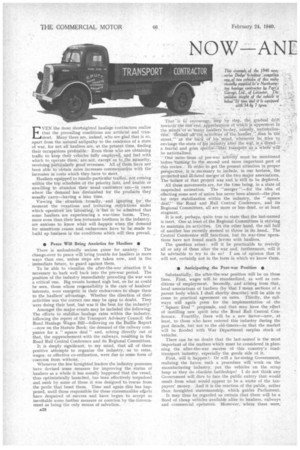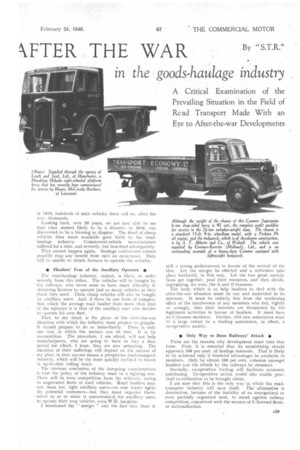NOW-ANL
Page 30

Page 31

If you've noticed an error in this article please click here to report it so we can fix it.
kFTER THE WAR By "S.T.R."
in the goods-haulage industry
A Critical Examination of the Prevailing Situation in the Field of Rc ad Transport Made With an Eye to After-the-war Developments
EVEN the Most shortsighted haulage contractors realize that the prevailing conditions are artificial and transient. Many there are, indeed, who are glad that is so, apart from the natural antipathy to the existence of a state of war, for not all hauliers are, at the present time, finding their occupations profitable.. Even those who are obtaining traffic to keep their vehicles fully employed, asad fuel with which to operate them, are not, except as. tosthe minority, receiving particularly good revenues. All of them have not been able to obtain rates increases commensurate with the increases in costs which they have to meet.
Hauliers equipped to handle particular traffics, not coming within the top schedules of the priority lists, and unable or unwilling to abandon their usual customers are—in cases where the demand has diminished for the products they usually carry—having a lean time.
Viewing thesituation broadly, and ignoring for . the moment the vexatious and irritating restrictions under which operator 'ire labotfring, it ha fo be admitted that some hauliers are experiencing a war-time boom. They, more even than their less fortunate brethren in the industry, are anxious to know whit will .happen when the demand for munitions ceases and endeavours have to be made to build up business in the conditions which will then prevail.
• Peace Will Bring Anxieties for Hauliers • There is undoubtedly serious cause for anxiety. The change-over to peace will bring trouble for hauliers in more ways than one, unless steps aie taken now, and in the immediate future, to guard against them.
To be able to visualize the after-the-war situation it is necessary to hark well back into the pre-war period. The position of the industry immediately preceding the war was a critical one. Big events loomed nigh but, so far as could be seen, those whose responsibility is the care of hauliers' interests, were energetic in their endeavours to shape them to the hauliers' advantage. Whether the direction of their activities was the correct one may be open to doubt. They were doing their best, but was it the best for the industry?
Amongst the major events may be included the following: The efforts to stabilize haulage rates within the industry, following the report of the Transport Advisory Council; the Road Haulage Wages Bill—following on the Baillie Report —now on the Statute Book; the demand of the railway companies for a " square deal " and, arising directly out of that, the rapprochement with the railways, resulting in the Road Rail Central Conference and its Regional Committees.
It is deeply significant, to my mind, that all of these positive attempts to organize the industry, as to rates, wages, or effective co-ordination, were due to some form of coercion from without.
Whenever the few farsighted leaders the industry possesses have devised some measure for improving the status of hauliers as a whole it has usually happened that the vessel, thus optimistically launched, has been effectively torpedoed and sunk by some of those it was designed to rescue from the perils that beset them. Time and again this has happened, until those responsible for these statesmanlike eflorts have despaired of success and have begun to accept as inevitable some further measure or coercion by the Government as being the only means of salvation.
a2.8
That-is fo encourage, seep by step, the, gradual di:11f towards the One 'end, apprehension of which is uppermost in the minds of so many hauliers'io-day, na.mely, natiohaliza tibri.' activities of the haulier:',..nian in the street," 'at the back of his mind, whenever he tries to envisage the ,state of his industry after the war, is a-dread-1 a fearful and grim speetrethat tranipart as a •Whisie will be nationalized.
Ofie more 'item of pre-war aitivitY must be mentioned before 'turtling to the second and more important part of this review. Ifi order to get the present situation in proper perspective, it is necessary to include, in our horizon, the projected and ill-fated merger of the two major associations. The failure of that project was and is still to be deplored.
All these movements are, for the time being, in a state of suspended animation. The "merger "—for the idea of effecting some sort of union has never been absent—the plan for rates stabilization within the industry, the " square deal," the Road and Rail Central Conference, and its Regional Committees, all are more or less dead, or at least stagnant.
It is not, perhaps, quite true to state that the last-named is inert. One at least of the Regional Committees is striving to maintain its activities. On the other hand, the rail half of another has recently seemed to throw in its hand. The Central Conference still functions, hut its war-time operations have not found much favour with hauliers.
The question arises: will it be practicable to revivify all or any of them after the war and, furthermore, will it . be advisable to try to do so? I am of opinion that it will not, certainly not in the form in which we know them.
• Anticipating the Post-war Position •
Substantially, the after-the-war position will be on these lines. First, wages will be standardized, as well as conditions-of employment. Secondly, and arising from that, local associations of hauliers (by that I mean sections of a parent body which I shall shortly describe) will be able to come to practical agreement on rates. Thirdly, the railways will again press for the implementation of the " Square Deal" proposals, and that may have the effect of instilling new spirit into the Road Rail Central Conference. Fourthly, there will be a new factor—new, at least, to those who have entered this industry during the past decade, but not to the old-timers—in that the market will be flooded with War Department surplus stock of vehicles,
There can be no doubt that the last-named" is the most important of the matters which must be considered in planning the after-the-war success of this country's roadtransport industry, especially the goods side of it.
First, will it happen? Or will a far-seeing Government, realizing the havoc such a procedure will work on the manufacturing industry, put the vehicles on the scrap heap at they do obsolete battleships? I do not think any Government will ,dare to face the public outcry that would result from what would appear to be a waste of the taxpayers' money. And it is the reaction of the public, rather than farsighted statesmanship, which guides Parliament.
It may thus be regarded as certain that there will be a flood of cheap vehicles available alike to hauliers, railways and commercial operators. Moreover, where there were, in 1919,hundreds of such vehicles there will be, after the war, thousands.
Looking back, over 20 years, we are now able to see that what seemed likely to be a disaster, in 1919. was discovered to be a blessing in disguise. The flood of cheap vehicles then made available gave birth to the roadhaulage industry. Commercial-vehicle manufacturers suffered for a time, and severely, but benefited subsequently.
That cannot happen again. Haulage contractors cannot possibly reap any benefit from such an occurrence. They will be unable to obtain licences to operate the vehicles,
• Hauliers' Fear of the Ancillary Operator •
The road-haulage industry, indeed, is likely to suffer severely from this influx. The vehicles will be bought by the railways, who never seem to have much difficulty in obtaining licences to operate just as many vehicles as they think they need. These cheap vehicles will also he bought by ancillary users. And, if there be one form of competition which the average road haulier fears more than that of the railways it is that of the ancillary user who decides to operate his own fleet.
That, to my mind, is the phase of the after-the-war situation with which the industry must prepare to grapple, It should prepare to do so immediately. There is only one way in which. the menace can be met. It is by co-operation. The procedure, I am afraid, will not help manufactimers, who are going to have to face a lean period for which, I hope, they are now preparing. The duration of their sufferings will depend on the success of my plan; in that success means a prosperous road-transport industry, which will be the more quickly inclined to invest in up-to-date rolling stock.
The obvious conclusion of the foregoing considerations is that the policy of the industry must be a fighting one. There will be keen competition from the railways, owing_ to augmented fleets of .road vehicles. Road hauliers may not, must not, fight ancillary users—no wise trader fights his potential customers—but they must organize themselves so as to make it uneconomical, for ancillary users to operate their own vehicles, even W.1). bargains. I mentioned the '" merger " and the fact that there is
still a strong undercurrent in favour of the revival of the idea. Let the merger be effected and a redivision take place forthwith, in this way. Let the two great associations get together, pool their resources, and then divide, segregating, for ever, the A and 11 licensees.
The body which is to help hauliers to deal with the after-the-war situation must he one and undivided in its interests. It must be entirely free from the weakening effect of the interference of any members who feel, rightly or wrongly, that their interests are threatened by the legitimate activities in favour of hauliers. It must have no C-licensee members. Further, this new association must to a large extent he a trading association, in effect, a co-operative society.
• • Only Way to Stem Railways' Attack • These are the reasons why development must take that form. First, it is essential that its membership should approach 100 per cent, of haulage interests. That is likely to be achieved only if financial advantages be available to members. Only by almost 100 per cent, cohesion amongst hauliers can the attack by the railways be stemmed.
Secondly, co-operative trading will facilitate economic purchasing. Co-operative action would -also enable practical co-ordination to be brought about. I am sure that this is the only way in which the roadtransport industry will save itself. The alternative is destruction, because of the inability of an unorganized or even partially organized mob, to stand against railway competition, concurrent with.the menace of C-licensed fleets, or nationalization.




















































